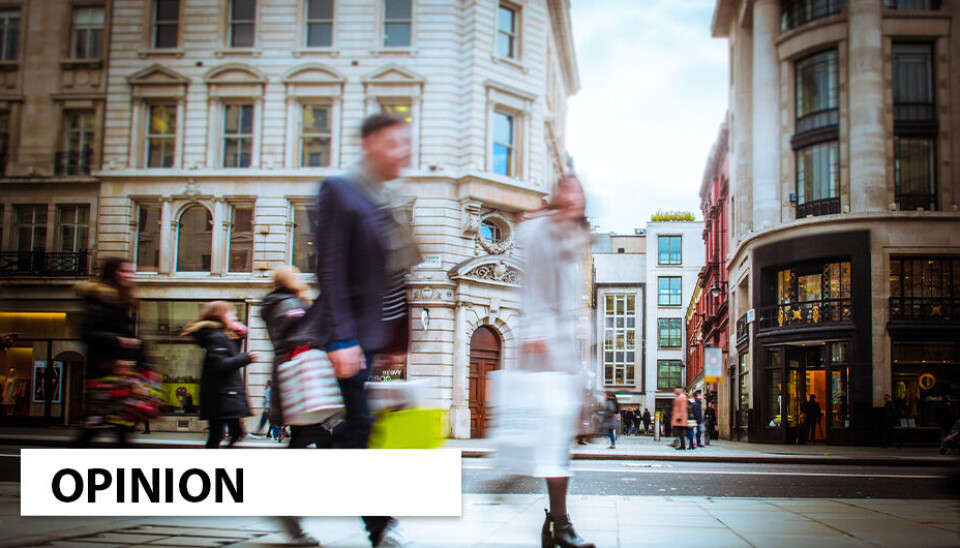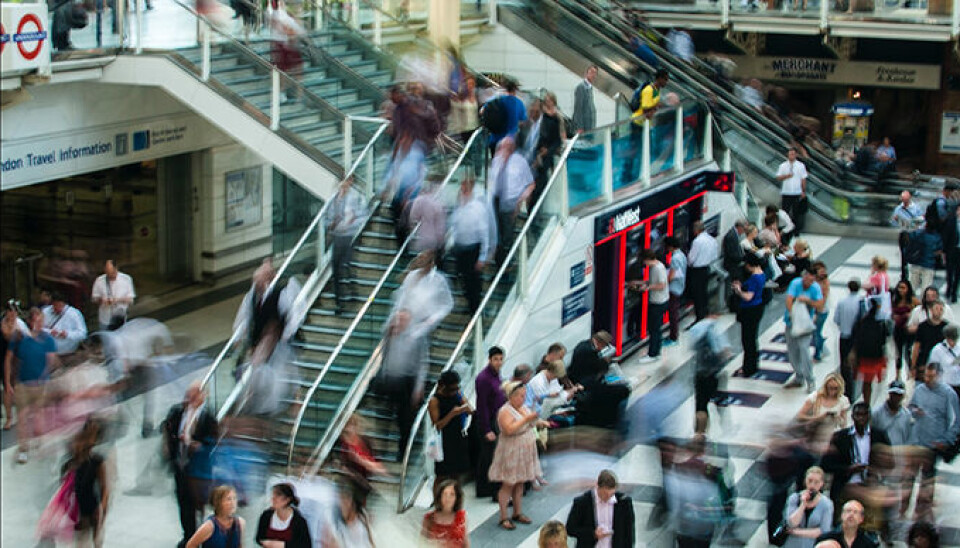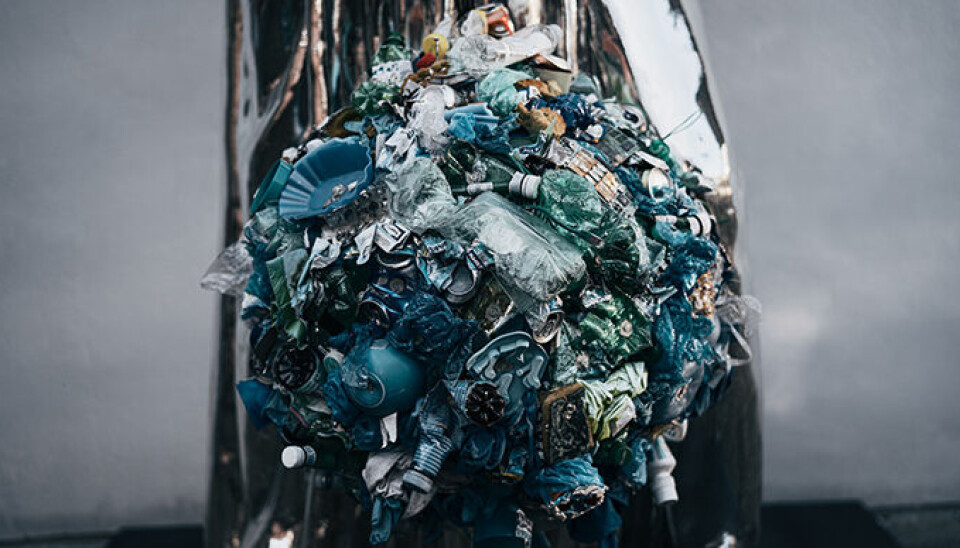Opinion:

Why overconsumption must be understood as a societal challenge
OPINION: Norwegians are world champions in consumption, but most of us feel our levels of consumption are completely normal. This is one of the reasons why sustainability transformations cannot be left to the consumers alone.
It is a well-known fact that Norwegians' consumption patterns are unsustainable, with consumption levels well above most other European countries. Nevertheless, most Norwegians feel that their consumption levels are nothing out of the ordinary.
Normalised overconsumption
Norwegian households are high consumers, and we consume much more than in the fairly recent past. For example, we eat twice as much meat and drive our cars six times as much as in the 1960s.
In many areas of consumption, Norwegians are world champions. We have high rates of home ownership and move houses often, which is one of the reasons why we renovate more than anyone else.
The average Norwegian has over 350 items of clothing in his closet, we buy 1.6 million mobile phones and 368.000 ever larger TVs a year and have the highest waste stream on electronics in Europe. Plus, compared to other European countries, only the French drive cars more frequently than us and we fly more (domestically) than anyone else. Even Norwegian environmentalists are often frequent flyers.
We simply live lives that require high consumption, and consumption contributes to defining how we participate in society.
Many hoped that the Covid-19 pandemic would slow down consumption because we had more time for sourdough baking and crocheting, but in fact, overall consumption of goods in Norway increased by almost 13 percent during the pandemic.
And, within a system where economic growth is premised on continued consumption—and where there are no political signals of change – consumption is likely to keep increasing. For many, this is desirable, and for most people, it also feels completely normal.
Consumption as socially conditioned
Talking about consumption can come across as both personal and moralising. It concerns you and me, our everyday lives and taken-for-granted comforts. Besides, few of us really want to change. When on the rare occasions that politicians dare to raise the topic of overconsumption, they are accused of wanting to lower living standards and force Norway backwards in history.
Consumption patterns are difficult to change. One of the reasons is that most of our consumption does not happen for its own sake, but for social reasons. We simply live lives that require high consumption, and consumption contributes to defining how we participate in society.
There is widespread agreement among researchers that consumption is largely driven by habits, which means that our behaviour is often fairly automatic. The fact that we go to specific stores, prepare and eat certain types of food, drive specific routes or buy certain garments are not necessarily as conscious choices as we like to think.
Therefore, it is much easier to repeat what we have done before than to change habits. Anyone who has had a New Year's resolution can probably relate to this. But habits are not individually formed, they are created, shaped and reinforced by our social and material surroundings, in other words the people and infrastructure around us. In turn, habits and the cues given by society make some actions appear easier and more appropriate—and hence more likely—in a given situation.
Norms limit alternatives
Our habits in turn contribute to establishing social norms. Norms are not necessarily something consciously reflected upon; we often know intuitively what is expected of us in different social settings. But when conflicts do arise between our ideals (for example, about consuming less) and what it means to fit in and participate in society, many end up doing what is expected of them out of fear of breaking with established ways of life.
Norms play vital roles in any society, but as high levels of consumption have become the norm, they can function as barriers towards change and limit the possibility of finding alternatives.

Convenience rules
Convenience also plays a central role in shaping consumption patterns. We are more likely to opt for simple, comfortable and convenient options. This, too, can conflict with ideals, for example between sustainability and time efficiency.
We tend to spend most of everyday life at work. In addition, the organization of everyday life has become increasingly complex, combined with ever more choice possibilities, and rising expectations of what one should be able to do and experience. Consequently, many find themselves in the well-known time squeeze (or at least time concern).
Thus, once we have time off, we strive for quality time. Consumption must therefore take place in the most convenient way, which in turn is facilitated by businesses that are constantly creating new services that will make it even easier for us to consume – and consume more.
It is, for example, simple and convenient to order a new pair of shoes online on your way from work which then arrives from abroad in the mailbox a couple of days later.
We can easily order clothes in different sizes and styles to try on at home – what is known as bracketing – and simply return the ones that don’t fit. Since it is simpler and cheaper to produce new ones than to reuse single items, the things we return often go to waste and end up in landfills.
The online stores also employ strategies to make it easier to consume more. They commonly use algorithms that suggest products we might like based on the shopping habits of other consumers with similar tastes. And again, if we end up not liking them, we can just return them.
Out of sight – out of mind?
Consumption is at the centre of the sustainability crisis, but is to a rather surprising extent ignored by politicians. On the climate and environmental side, the focus is on emissions within the country's borders, since this is how we measure greenhouse gas emissions. This renders more than fourty percent of emissions from Norwegian consumption invisible, because they occur in Asia, not in Norway.
The lack of attention at the political level makes it easier for consumers to deny or ignore the link between climate and environmental consequences and our own consumption. In parallel with the relocation of production (and a lot of waste management) to places with lower costs, fewer and fewer Norwegians have a connection to anything beyond consumption itself.
Distance and denial
When we relate to food, furniture, electronics or clothing simply as goods that can be found in the store or online, we miss the complex production processes consumption requires and the large amounts of waste it generates.
This does not mean that we do not know deep down how everything is connected, but the geographical and cultural distance between us, production and waste makes it easier for us to forget the links to consumption.
Consequently, we rarely connect wages and working conditions at Asian textile factories or D.R. Congo's mining industry to '3 for 2' offers from H&M or SWAP subscriptions on mobile phones. And we can criticize the Norwegian pork industry for animal welfare violations without reducing the consumption of pork.
And this is where we get to the core of why attempts to change consumption so often fail.

Failed individual focus
When consumption is a topic in environmental discussions, it tends to be the individual consumer who is expected to take responsibility for change. This is based on a misguided belief that if a consumer has more knowledge and information, they will automatically change their behavior. This rests on a modelling of the consumer as taught in an introductory course in economics; a rational individual weighing all the pros and cons against each other before making a choice.
The problem is that this is far from how we really function. If we are to achieve changes in consumption, we must think holistically and make sustainable alternatives more convenient. In many cases, there will also be win-win situations related to consumption changes; eating less meat can for example have positive effects on the climate, environment, health and animal welfare.
The smoking ban that was introduced in Norway in 2004 would never have been as effective if it was just an awareness campaign. We cannot reduce car use in city centres without making it more expensive or less attractive to drive cars there. And we will not succeed in increasing bicycling without strengthening the cycling infrastructure and making it safer to travel on two wheels.
Alternatives to the current system of consumption must become both cheaper and easier. At the same time, we need to be able to discuss what reduced consumption means without being shrugged off as radical environmentalists in order to create new perceptions and narratives of what progress and prosperity can mean beyond endlessly increasing material living standards.
The road to a more sustainable society should start with consumption, but it cannot be left to the consumer alone.
(This text is a revised version of a text first published (in Norwegian) by forskersonen.no: Å uffe seg over høyt forbruk fører ikke til endring (forskersonen.no). Special thanks to Tom Neumark for help with the translation.)
FURTHER READING:
Share your science or have an opinion in the Researchers' zone
The ScienceNorway Researchers' zone consists of opinions, blogs and popular science pieces written by researchers and scientists from or based in Norway. Want to contribute? Send us an email!






























